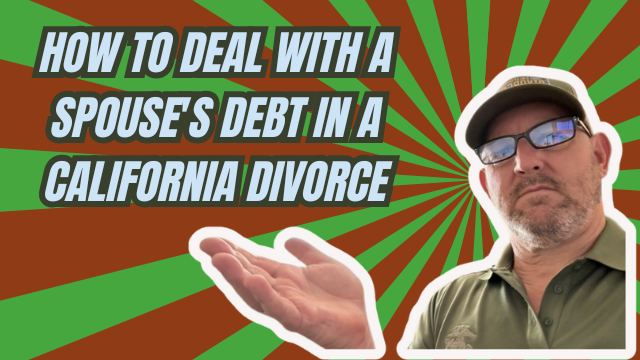How to Deal with a Spouse’s Debt in a California Divorce
If your spouse has racked up credit card debt, personal loans, or other obligations during your marriage, you are probably asking yourself, “Am I responsible for their bills too?” The short answer is: it depends on when and how the debt was incurred. Understanding California law can protect you from unexpected financial obligations and help you negotiate a fair division of debt during divorce.
California is a community property state: what that means for debt
In California, most debts acquired during the marriage are treated the same way as marital assets. In practice, that means:
- Debts incurred during the marriage are generally community debt and are shared by both spouses, regardless of whose name is on the account.
- Common examples include credit card balances, personal loans, and even tax liabilities that arise during the marriage.
- Debts from before the marriage or those clearly tied to separate property are usually considered separate debt and remain the responsibility of the spouse who incurred them.
Community debt versus separate debt: how to tell the difference
Determining whether a particular debt is community or separate usually requires answering two questions:
- When was the debt incurred? If it was taken on during the marriage and before the date of separation, it is typically community debt.
- Is the debt connected to separate property? If a debt was taken out to buy or improve separate property and can be clearly traced, it may remain the separate responsibility of the spouse who used the funds.
Documentation is critical. Bank statements, loan applications, receipts, and communications can help prove when and why a debt was incurred.
Real example: hidden personal loans and how we resolved them
We recently worked with a client whose spouse had secretly taken out multiple personal loans during the marriage. The loans were discovered during the divorce process. Because those loans were taken out before the date of separation, they were community debts and both spouses were legally responsible for them.
Rather than leaving our client with half the loan balances to pay out of pocket, we negotiated a fair offset. We valued other marital property and adjusted the property division so the client did not shoulder the loan payments unfairly. The result was a judgment that allocated responsibility and avoided forcing our client to pay half of the secret loans from personal funds.
How to protect yourself during debt division
Use these steps to protect your finances while navigating debt in a California divorce:
- Identify all debts. Request credit reports and full financial disclosures from your spouse. Look for credit card accounts, personal loans, lines of credit, and tax obligations.
- Document timing and purpose. Keep records that show when the debt was incurred and whether it funded marital needs or separate property.
- Ask for offsets. If community debt exists, it can be offset against other community property so no one is unfairly burdened.
- Get clear language in the judgment. A properly drafted judgment should specify which debts each party is responsible for to avoid future surprises.
- Consider protections for joint accounts. Close or separate joint accounts where possible, or get clear court orders to assign responsibility for payment.
Why clear debt division matters
Putting debt division in writing as part of your final judgment prevents future disputes and protects your credit. Without a clear court order, creditors can still pursue either spouse on joint accounts even after divorce. A well-drafted judgment makes the financial responsibilities explicit and enforceable.
How professional help can ease the process
Dividing debt can be complex, especially when debts are hidden or mixed with separate property. Experienced help can:
- Identify what is community debt and what is separate debt.
- Negotiate offsets so one spouse is not unfairly penalized.
- Ensure the judgment contains precise debt allocation language so there are no surprises later.
Next steps
If you are dealing with debt issues during your divorce and want help protecting your finances, schedule a free consultation to discuss your situation and options. Proper planning and clear judgment language will help you move forward with confidence.
“We help you identify what debt is community and what’s separate. And we make sure it’s divided properly in your judgment so there are no surprises later.”
Visit Divorce661.com to schedule your free consultation and learn how flat-fee, remote divorce services can protect your financial future.


